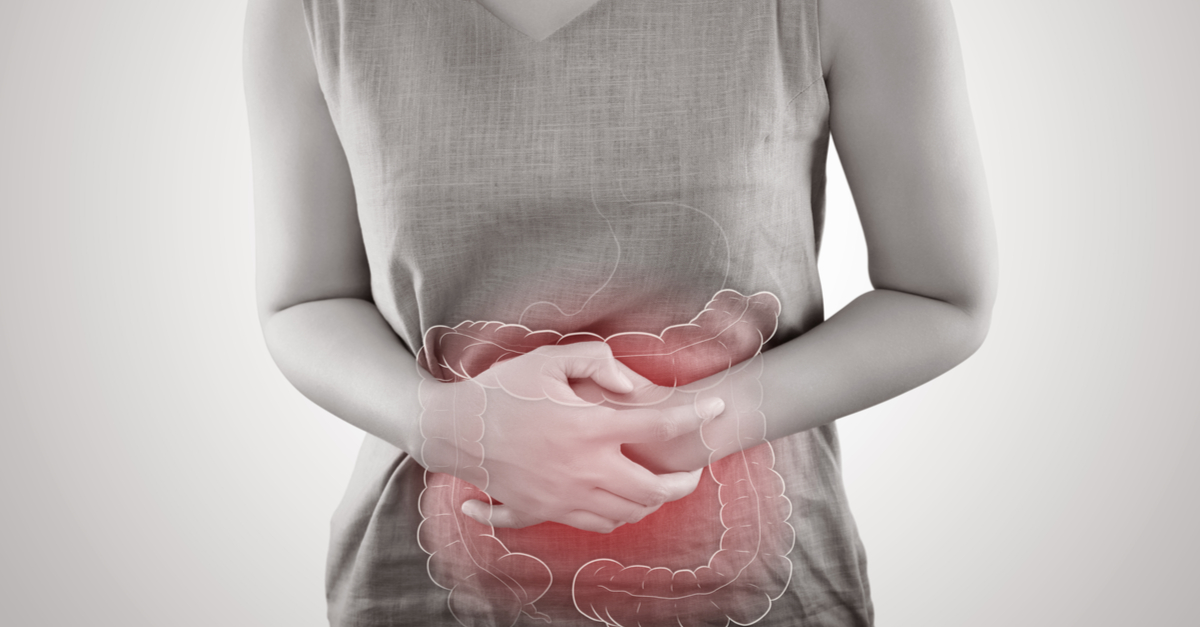4 Common Signs of Constipation

At some point, almost everyone has suffered from constipation. It’s likely that 50% of people over the age of 50 have some level of constipation. (1) The problem is that you might be suffering from IBS-C but think that it’s normal.
As humans, we are usually prone to accepting the way things are and how we are feeling. The reality, however, is that suffering from constipation greatly increases your chances of hemorrhoids, anal fissures, diverticulitis and megacolon. (2)(3)
You might be thinking, “Hemorrhoids?! Not me!” Well, I’ve got news for you. Those painful little buggers are estimated to affect 75 % of Americans. (4) Those are not good odds. Before I get into explaining how to tell if you’re suffering from constipation, I need to clear up a huge misconception.
Constipation is NOT From a Lack of Fiber (Not a Volume Issue)
If you’re constipated and taking fiber to become “more regular” it’s likely you are actually doing more harm to yourself than helping the problem. This is a huge misconception because clinical studies have shown that additional fiber does NOT help constipation. (5)
Constipation is an evacuation problem, not a bulk or amount of poop problem.
In other words, the complications I mention below, are signs something is preventing you from properly passing your stools in a timely manner; there isn’t a lack of poop.
Those fiber ads you see on TV are trying to sell you more fiber based on studies that show when healthy people ingest fiber their stools increase in weight, which is true – fiber will add bulk and increase the size of your stool. However, if you have a colon full of poop, you don’t need more poop, you need to get rid of it faster. Taking more fiber can actually increase the chances of stretching out the colon and causing nerve damage. (6)
With that said, let’s talk about signs that you’re having an evacuation problem.
4 Clues Your Poop is Telling You About Constipation
As you may know, constipation is a broad term, so let’s break it down. On one end of the spectrum, we’ve got mild-intermittent constipation. On the other end, we’ve got chronic constipation. If you have one of the problems below, then you’re dealing with at least a moderate level of constipation. The more of these problems you show on a weekly basis the closer you are to dealing with chronic constipation. It becomes quite difficult to put into words where you are on this scale, which can cause a bit of confusion in the doctor’s office. To gain a better understanding, talk to your practitioner by describing your bowel habits using these clues:
1: You’re Not Going #2 Every Day
The most common response I get when asking a constipated person how often they go starts with… “I’m normal for me. I go about 2-4 times a week.”
Houston we have a problem! Take another look at that phrase for me. If you can tell me how often you go per week, then there is definitely something wrong. Most people will forget how many bowel movements they had yesterday by the end of today. You should be thinking in terms of how often you go per day not per week.
If you’re not pooping at least once a day, then you have sluggish bowels and are considered to be dealing with some degree of constipation.
2: Your Poop Looks Like a 100 Grand Bar or Coco Puffs
Yummy right? Let’s not get too serious here. Health problems already suck. As gross as that line may be, these mental pictures can be the clues you need to help remember what you don’t want your poop to look like.
If you haven’t heard yet, there’s a medical poop scale called the Bristol Stool Chart. This chart gives us a metric to figure out how we stack up. In case you’re wondering, it also shows what an ideal and healthy poop looks like. This is long, smooth and soft (#4 or #5 on the chart).
The pictures on the chart from #1 through #3 (lumpy, hard, or pellets) are all stools that are on the constipated side. Use the Bristol Stool Chart to help you gauge and keep track of what you see in the toilet.
3: You Push, Strain and Take Too Long in the Bathroom
In the Western world, there’s a cultural joke about men and women going into the bathroom for 20, 30 or even 40 minutes just to poop. People read magazines, play games and check email on their phones and purposely use this time to catch up on a good book! I’m going to be blunt; if you do any of these things you’ve already spent too long on the toilet. While you may consider this to be normal, it’s not. At some point you’ll probably catch yourself pushing or straining to squeeze it, which is a perfect recipe for anal fissures and hemorrhoids.
I need to hammer home this reality: in order to have healthy hemorrhoids, you want to have a NASCAR-like pit stop. We’re talking touch and go… in and out and back to life. If you get your “20-minute breaks” by heading to the restroom, then it’s time to reevaluate. This time could be spent doing many other things like going for a walk.
4: Your Colon is Never “On Empty”
I’m not quite sure why I’m on a NASCAR theme today, but it seems to fit. If you’re constantly feeling full, bloated, heavy or not done, then you’re constipated.
What’s happening here is that you’re not fully evacuating the stool in the colon. And now your nerves are reminding you to go back to the toilet for another push and squeeze slugfest.
The best thing to do is ignore this urge. While I completely understand how nagging and annoying the feeling is, going back to the toilet to strain again is only going to lead to a risk of developing painful hemorrhoids, anal fissures or other problems. It’s best to wait and try to forget about that feeling until it turns into a full-blown, it’s time to go now, urge.
According to many doctors, there is no risk in holding your poop for short periods of time. The peristalsis waves that give you that initial slight urge will come back and likely be stronger than ever. Hopefully at this point you will be able to completely empty the tank.
The Next Step, if You’re Having Constipation is to…
Begin by tracking the signs I mentioned above more closely. Then, you’ll begin to understand if you are having a lifestyle problem, diet related issue, supplement/drug problem or altogether deeper issues. It might only take one small change to fix your constipation and reduce your chance of hemorrhoids and further digestive problems. Then again, you might have all four of the issues above and need to make some major changes in your life.
Stress can really constipate some people. For instance, you might find after weeks of tracking your symptoms that every Thursday you get constipated, which also happens to be the same day as your big staff meeting. In that case, you’ll know stress is the first thing to focus on.
Some of you will want to change your diet and adopt some real food constipation relievers.
Prescription drugs used to treat anxiety, depression and pain often cause constipation. Until those issues are properly dealt with and you’re off the meds, you’ll need to pay special attention to the tips in the article above.
Then, there are those with several issues like underlying hormone dysregulation, gut infections and liver toxicity issues. Despite making all of the right diet and lifestyle choices, these people will often remain constipated. Many of the people I work 1-On-1 with fall into this category.
In any case, the solution starts with tracking the problem.
Changes to Relieve The Constipation
After you understand the baseline of your bowels, the next step is to start making short-term and long-term changes to get rid of the constipation once and for all. The best place to get these strategies is our Unlocking Constipation training worksheets and action plans.
There are 3 hours of everything you need to learn to be smarter than your doctor about constipation, including next steps to start pooping regularly next week (short-term) and what tests are needed to get to the root causes of constipation (long-term). I dive into topics like: why fiber is a really bad idea (despite what you’ve been told), the underlying root causes of constipation, tests, supplements and protocols you could use with your doctor once you get your test results back.
It’s a pretty small investment to be completely educated on a health problem that is seriously affecting your life. And it includes things like an emergency “I need to poop now” protocol if you don’t want to take laxatives.
After you do, let me know in the comments below about how you are overcoming constipation.
-Steve
Did You Like this Article?
Subscribe to our newsletter to receive email notifications, some ways to find relief, and next steps.
